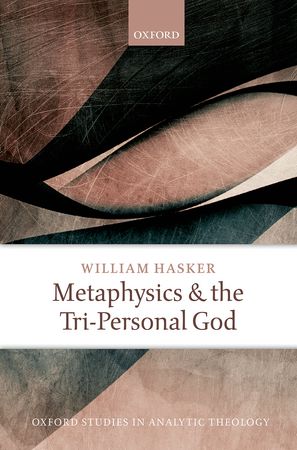Podcast: Play in new window | Download
Subscribe: Spotify | Email | RSS
 In the last thirty years or so, many Christian philosophers have become “social” trinitarians. Not only do they “use the social analogy” for the Trinity – that is, compare the Trinity to three humans – but they also, generally, affirm that the Trinity really does contain or consist of three selves- three beings capable of thought, action, and personal relationships.
In the last thirty years or so, many Christian philosophers have become “social” trinitarians. Not only do they “use the social analogy” for the Trinity – that is, compare the Trinity to three humans – but they also, generally, affirm that the Trinity really does contain or consist of three selves- three beings capable of thought, action, and personal relationships.
Dr. Hasker did this before it was cool, in a 1970 article. This sort of view has been perhaps most famously explored by leading Christian philosopher and analytic theologian Richard Swinburne, in his 1994 The Christian God. Before 2013, I would’ve said that was the best developed “social” theory.
But it’s now been surpassed, by William Hasker’s 2013 Metaphysics and the Tripersonal God. This is an important new book, which develops the idea of a three-self Trinity in interaction with a number of recent philosophers and theologians.
In this interview, we discuss his background, how he got started seriously thinking about the Trinity, understanding mysteries, divine simplicity, and how he interprets the terms “person” and “essence” in the traditional claim that the one God is “three persons in one essence.”
You can also listen to this episode on youtube.
In the next episode, we’ll continue the conversation, discussing how how, in his view, these three divine selves can amount to one God.
Hasker links (you can support the trinities podcast by buying from Amazon through these links):
- Metaphysics and the Tripersonal God
- Hasker lecture, discussion, and interview at the Center for Christian Thought at Biola University.
- The Triumph of God over Evil: Theodicy for a World of Suffering
- Providence, Evil and the Openness of God
- The Emergent Self
- God, Time, and Knowledge
- The Openness of God: A Biblical Challenge to the Traditional Understanding of God

Dale, you may find of interest this piece that I just put up on my blog, particularly since I take your name in vain. 🙂
Father, Son, Spirit as Divine Selves
What does one do when words and logic do not support what one chooses to believe?
One either –
—Dismisses the ‘bearer ‘ of the words and logic -the analytic theologians
OR
–One rationalises.
One creates ‘models’ , ‘constructs’ from which one draws a further array of conclusions
From here on, it’s just pure speculation!
If one challenges such persons one is told ‘we are trying to see how we can ‘fit’ ‘the facts’ into
prevailing dogma ‘ -or words to that effect.
It doesn’t seem to matter whether dogma is ‘truth’ – or pure gobbledygook!
The problem seems to arise when the derived ‘constructs’ are taken as reality – and the ‘wise ones’ start condemning -or burning people!
Best wishes
John
FYI: “William Hasker, Orthodoxy, and the Social Trinity”: http://goo.gl/NUG6QL.
Hi Dale! I found the interview very interesting. Prof. Hasker is at least consistent in rejecting the doctrine of Divine Simplicity since it appears impossible to reconcile it with a composite God containing 3 selves as distinctions. Even though the professors book has a high price tag for an everyday butthead like myself, I’m seriously considering purchasing. Because you have read his book maybe you could answer something about it’s content for me. Since Prof. Hasker apparently prefers a concrete view of Divine nature, does his book tackle the seeming universal reference to homoousios found within the creed of Chalcedon ( homoousios with us according to his manhood) ? I’m sorry I missed meeting you when you were out for the theological conference. I hope you enjoyed our “”drought”. take care.
Comments are closed.